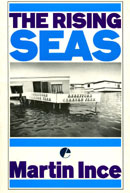

|
|

The Rising Seas
Ince, Martin
Publisher: Earthscan Publications, London, United KingdomYear Published: 1990 Pages: 152pp ISBN: 1-85383-077-1 Dewey: 333.784 Resource Type: Book Cx Number: CX4505 Abstract: While acknowledging that the world does not yet have the technology or data to accurately forecast the extent to which global warming will cause sea levels to rise, Martin Ince does not support "anyone who proposes standing in the way of the oncoming juggernaut on the grounds that it may be an optical illusion". In his book, The Rising Seas, science correspondent Martin Ince discusses predicted sea level rises, maintaining that no continent or island will remain untouched. The Third World, lacking the defence and relief resources will be the hardest hit and "the picture of disadvantaged nations and people being harmed further by sea level rise caused by the developed world's pollution habits presents policy makers with the starkest possible moral issues -- or should" says Ince. In a world warmed by greenhouse gas emissions, sea levels will rise as water becomes warmer and expands and as glaciers begin to melt. The small glaciers of the Alps and Scandinavia already show evidence of rapid retreat in the last few decades. Ince cites many examples of nations, people, animals and plants which will suffer as sea levels rise. For example, low lying Bangladesh, where flooding has already killed thousands, is extremely vulnerable. Some small states may be totally destroyed but damage from rising seas will also be insidious -- erosion to buildings, salt infiltration in drinking water systems. Mangrove swamps, tolerant to brackish water, will suffer as precious sediment is washed from the trees' roots. Coral reefs, some scientists believe, may be endangered by deeper, warmer seas. Dealing with sea level rise will take new knowledge, engineering, technology, and new practices and methods in every field from town planning to agriculture. Ince discusses ways of facing the rising seas, from dams to simply allowing the sea to claim certain areas which would then become buffers, protecting other places further inland. Rising sea level, says Ince, is not "a free standing policy problem", it is a part of the whole global warming problem. "The real issue is not how high up the beach the high tide comes but instead, the subject contains subtle and difficult arguments about science, money, morality, people and politics." Subject Headings
|